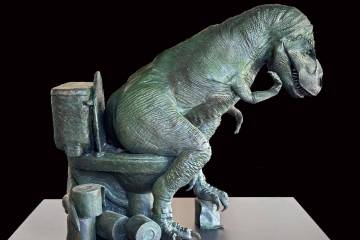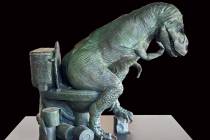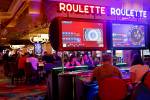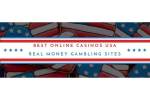Betting on second chances
Car mechanic Anthony Ramirez took his $1,580 paycheck to a local casino to cash it and left the property a few hours later with $75.
That's not unique in Las Vegas, right? If you had a dime for every story like that, you wouldn't need to play Megabucks anymore.
What's different here is that Ramirez had a dream a few days later that showed him how to win it all back.
"I woke up my wife at 2 a.m. and started telling her what I saw," Ramirez said. "We just started working on it from there. I decided that if I couldn't beat them, I was going to join them."
Ramirez turned his 2003 vision into a table game called 21 to the River, and today, that game is scheduled for an unveiling at Binion's.
Ramirez, a former gang member who survived a crippling car wreck in 1991 and still works as a mechanic, has beat a different set of odds. Thousands of gamblers think up new games every year, but few will ever get their ideas onto the casino floor.
"It's not unusual for laymen to bring in a new game, but bringing in a game that has good numbers, and that we think will be successful, is very unusual," said Glenn Casale, director of casino operations at Binion's.
Here's how Ramirez' second-chance game works: You play it on a standard blackjack table, but when you bust or break your blackjack hand, instead of losing money, your bust card moves over to a poker game. The dealer finishes dealing blackjack for players still in that game, and then returns to you and gives you four new cards for a poker hand.
"You get a chance to win back your money, plus a lot more," Ramirez said.
Casale, who'll often give a game a chance if its creator can show him how to play it within five minutes, said 21 to the River's straightforward concept caught his eye.
"It's the simplicity of the game," Casale said. "He came up with a good idea, with the side bet in blackjack being the poker bet."
The game proved such an intriguing concept that customers queued up to play it during training Tuesday and Wednesday, before it had officially opened for business. That positive feedback encouraged officials at Binion's to put 21 to the River online Wednesday night, two days ahead of schedule.
Ramirez hopes for that kind of reception at other area casinos. The Hard Rock has offered 21 to the River for about nine months, and Ramirez is negotiating with several casinos on the Strip, as well as a couple of locals places, to put 21 to the River on the floor. If he can get the game inside 100 casinos worldwide, he could begin pulling in profits.
Ramirez' task won't be easy, though he's already maneuvered some of the toughest obstacles game inventors face.
Developing a game involves a complex process, starting with a patent search to ensure no one thought of your idea first. It continues with seeking professional analysis of the game's winning percentages, hiring a designer to lay out the game, finding a manufacturer to make a prototype and retaining a company to aid with marketing materials.
All that consulting costs big bucks. Ramirez estimated that he's dropped $280,000 in the last two years on creating and promoting 21 to the River, selling his cars, drawing down his and his wife, Norma's, savings and pawning family possessions.
What's more, casinos must pay royalties on new games like 21 to the River. Popular newcomers can cost a casino upward of $2,300 a month per table in licensing fees -- an expense casinos don't shell out for established, patent-free games such as blackjack and roulette.
Casinos also must conduct a 90-day trial of a new game, during which regulations require a property's executives to monitor the game constantly for issues. Operators must analyze what the game earns weekly, and they have to report every customer or dealer complaint. Paperwork mounts quickly, Ramirez said.
"I feel bad for a lot of these inventors because casinos don't want to go through that," he said. "They don't need us. They make so much money anyway."
Ramirez will quit his job with Midas next month to focus on convincing casinos they need 21 to the River. He's also developing an instructional DVD designed to advise other entrepreneurs on breaking into the game-creation business.
"It's one of the hardest industries to get into, but if you make it, you'll be well off for the rest of your life," said Ramirez, who added that he no longer plays table games unless his friends treat him.
Casale thinks 21 to the River has the potential to succeed. He pointed to Blackjack Switch, which allows players to make two blackjack bets at once and switch the second card of each hand, and how that game has proliferated in casinos across Nevada and the Pacific Northwest as an example of the possibilities.
"I really think 21 to the River has prospects," Casale said. "I think this game is going to do the same thing as Blackjack Switch."
Contact reporter Jennifer Robison at jrobison@reviewjournal.com or 702-380-4512.




























